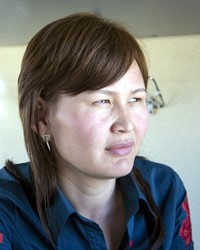Kazakh in Russia

Photo Source:
Petar Milošević - Wikimedia
Creative Commons
|
Send Joshua Project a map of this people group.
|
| People Name: | Kazakh |
| Country: | Russia |
| 10/40 Window: | No |
| Population: | 590,000 |
| World Population: | 17,966,900 |
| Primary Language: | Kazakh |
| Primary Religion: | Islam |
| Christian Adherents: | 0.10 % |
| Evangelicals: | 0.01 % |
| Scripture: | Complete Bible |
| Ministry Resources: | Yes |
| Jesus Film: | Yes |
| Audio Recordings: | Yes |
| People Cluster: | Kazakh |
| Affinity Bloc: | Turkic Peoples |
| Progress Level: |
|
Introduction / History
The Kazakhs of Russia belong to a larger group of people who live primarily in present day Kazakhstan. Traditionally the Kazakhs were semi nomadic, equestrian tribal people who roamed the Ural Mountains and the regions of North and Central Asia of Eurasia. Only people of the Kazakh ethnic group are called Kazakhs, while the term Kazakhstani refers to the people of Kazakhstan, inclusive of all ethnic groups living in the country. Kazakhs developed a distinct ethnic identity in the late 15th and early 16th centuries. As several of the clans formed a federation for mutual protection, they took on an ethnic identity of their own. Through the years the Kazakhs closely preserved their culture by keeping an epic tradition of oral history. During the late 19th and early 20th centuries, the annexation of Central Asia by Russia and the Soviet Union respectively, resulted in many Kazakhs fleeing the steppes to Europe and Asia, with many later becoming citizens of those countries. A small number of Kazakhs live in Eastern European countries like Lithuania, Czechia, Ukraine, and a larger number are in Russia.
What Are Their Lives Like?
As the Kazakhs dispersed during the Soviet annexation, the diaspora Kazakhs, over time, embraced the language and traditions of the land they emigrated to. Most of the Kazakhs in Russia speak Russian, though they might speak Kazakh at home. Most Kazakhs in Russia live in an urban environment in houses or small apartments, taking up low paying jobs. Western style dress is common among urban Kazakhs. The Kazakhs in Russia eat mainly the foods of the host country, but they also have their own cuisine. Besbarmak is a traditional Kazakh food, made with boiled lamb. Rice and bread are common staples. They have tea with almost every meal. The structure of the Kazakh family is patriarchal, or male-dominated, but this is gradually changing, especially in urban Russia. Such changes have caused a breakdown in the traditional Kazakh family. However, Kazakhs still retain an extremely hierarchical view. Elderly people and those with high positions are given great respect and honor.
What Are Their Beliefs?
The Kazakhs are Sunni Muslims and are the second largest Muslim group of Central Asia. Islam was first introduced to them in the early eighth century. Their Islamic practices are combined with traditional folk religions such as shamanism, animism and ancestor worship. Even now many Kazakhs continue to consult shamans (priests who communicate with the spirits). They also practice traditional rituals before and after marriage, at birth and at death. Many of them wear "protection" beads and talismans to ward off the evil spirits and the evil eye. Since 1818 missionary efforts by various Christian organizations has borne fruit among the Kazakhs. Today the entire Bible and other resources are available in the Kazakh language.
What Are Their Needs?
Kazakhs in Eastern Europe need job training so they can flourish in an urban environment. They also need the chance to hear and respond to the Risen Lord.
Prayer Points
Pray for a "Book of Acts" type of movement to Christ among the Kazakhs in Russia. Pray for the Kazakh people to understand and embrace that Jesus wants to bless their families and neighborhoods. Pray for Holy Spirit anointed believers from the Kazakh people to change their society from within. Pray for a movement in which the Holy Spirit leads and empowers disciples to make more disciples. Pray for a movement of Jesus to heal and strengthen Kazakh communities.